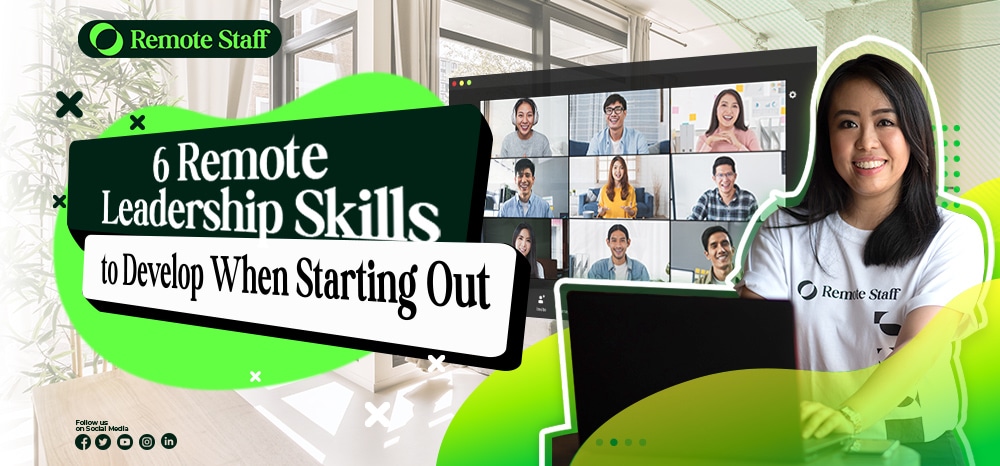A set of skills essential to climbing the career ladder is leadership skills. Yes, having the necessary credentials is also vital to promotion. But having the ability to apply these skills and interact with your co-workers well is just as important, if not more.
This is true in an office setting and remains so even in a remote one. For the most part, remote leadership skills aren’t so different from their traditional counterparts. The main difference is the lack of face-to-face interaction between you and your co-workers.
So, how do you start improving your leadership skills, then? And which leadership skills to develop first? To answer these questions, here are six remote leadership skills you should hone when starting your career.

Having Initiative.
“Nothing ventured, nothing gained.” As they say. A mark of a great leader is taking the initiative and accomplishing their tasks without being told. Why wait for your supervisor to assign you a vital assignment when you can do them now if you know you can do it?
Having initiative shows you’re confident in yourself and your abilities. As well as your capacity to learn and grow from your experiences. This also demonstrates to your employers that they can trust you to work without too much micromanagement.
However, this goes beyond sticking to what you know or are good at. You should also welcome opportunities to learn new skills outside what you know, as these will widen your skillsets and give you new perspectives.

Excellent Communication Skills.
Even in remote setups, issues can arise between you, your supervisors, and your co-workers. The distance can cause communication issues you’ll rarely find in an office. Because of this, one of the most essential remote leadership skills you should hone is communication skills.
Communication skills don’t just mean you can speak and write well to your co-workers and supervisor. Listening well to what they have to say is another part of it that’s sometimes overlooked by aspiring leaders.
It allows you to better understand others’ perspectives and offer more meaningful advice to them. This helps establish trust between you and your co-workers and boss.

Able to Take Criticism.
Nobody’s perfect. But the difference between someone who’s leadership material and someone who’s not is how they handle criticism and bounce back. Great leaders take full responsibility for their and their team’s errors; and welcome constructive criticism to improve in the future.
Contrast this with someone who’s always defensive when taking criticism and comes up with excuses for their shortcomings. If they’re in charge of a group assignment, they’ll try to shift all the blame for the error to their teammates instead of defending them. Between these two, who would you want to work with?

Problem-solving Skills.
Life is a never-ending cycle of encountering challenges, especially now that the nature of working has changed radically. New problems previously unknown to employees and employers have appeared, and many are having trouble adapting to these.
If you want to stand out this early in your career, then problem-solving skills is one of the remote leadership skills you should hone. Having this skill allows you to calmly assess your current situation so you can find the best solution to it. It also helps you make quick decisions and ensure assignments are accomplished on time.

Team-building Skills.
No leader is complete without having the ability to rally and maintain a team. Of course, if you’re just starting your career, you won’t have many opportunities to lead a team yet. Instead, focus on integrating well with your team and learning the company culture first.
But what if you’re an introvert? Does that mean you won’t have opportunities to show your team-building skills? Not really. Despite what some may think, introverts also have skills that make them great leaders.
They’re great listeners and prefer sharing the credit for a successful task with the rest of the team. Furthermore, introverts also prefer placing their trust in their teammates rather than micromanage them.

Able to Teach and Mentor Others.
Helping one another grow career-wise is an essential responsibility of a leader, especially now in a remote setup. Given that you’re still starting your career, you’re the one being mentored and supported right now. But that doesn’t mean you can’t teach your co-workers a thing or two.
They may be excellent in an office but may have some difficulties transitioning to an office. You can support your older co-workers on how to use modern apps and online processes, for example. By helping one another, you foster trust and camaraderie within your group, which helps improve both workplace morale and productivity, even if you’re all working remotely.

It’s Never Too Early to Lead.
Becoming a great leader is more than possessing charisma and a skillful tongue. You should also have the right skills to form, maintain, and grow your team. But honing these leadership skills takes time, so knowing which ones to prioritize is a great help in improving your chances of an early promotion.
With this guide, you now know which remote leadership skills you should start honing at the start of your career. If you want more helpful articles for new remote workers, check out Remote Staff’s blog for more.

